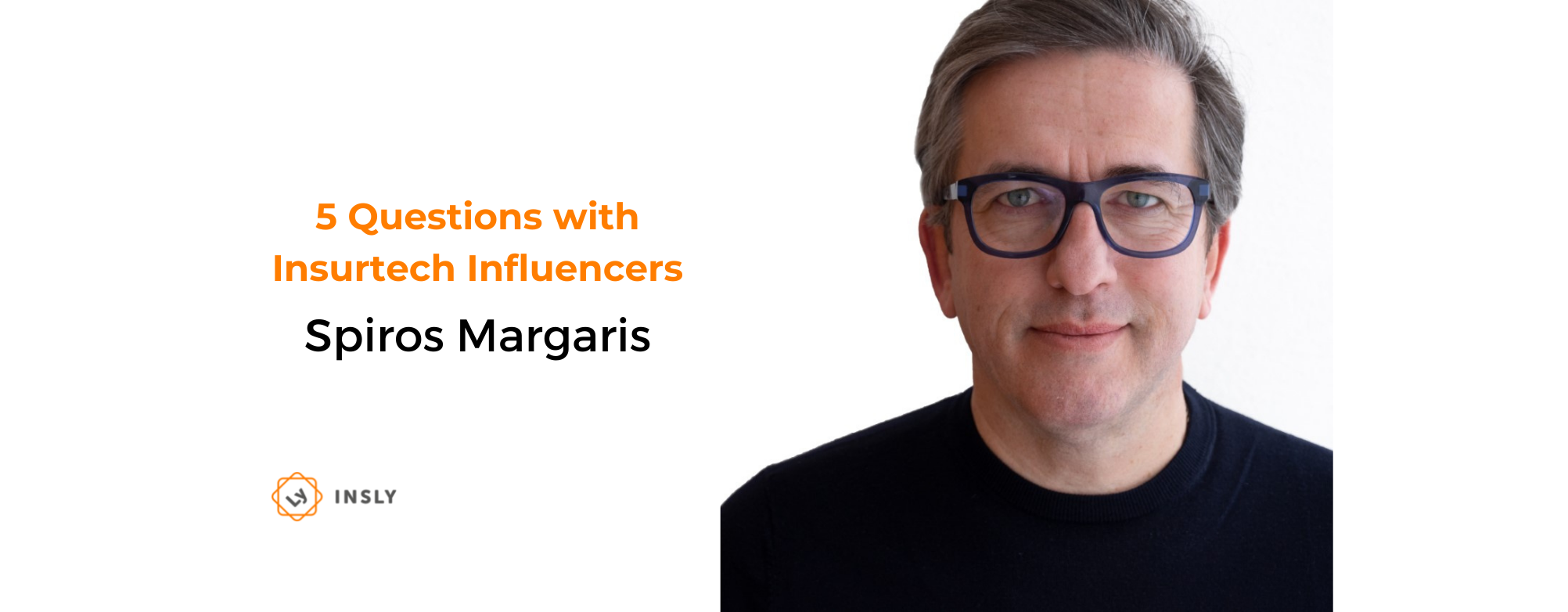Another thrilling story from a great insurtech influencer – Spiros Margaris. Spiros is a venture capitalist, futurist, keynote speaker, and senior advisor to many insurtech start-ups and unicorns. He envisions that the insurtech industry will have to deploy very sophisticated AI algorithms, IoT, and much personal data, and deploy it in the most ethical and transparent way possible.
Spiros believes that we will see B2C and B2B sectors gaining strong funding, since we are clearly at the beginning of the insurance industry disruption. Competition will come not only from the incumbents, but also from tech giants and non-financial companies, in the wider fintech space. Find out more from Spiros’ answers below.
1. Please name three of the most promising insurtech start-ups in 2021. Why exactly these?
I can’t help but mention the Berlin-based insurtech wefox (full disclosure: I am associated with this start-up), which just raised $650 million in June 2021. With such massive and impressive funding, it seems they are well-positioned to execute their successful strategy and vision on a global scale.
I also like Metromile, the San Francisco insurtech, which provides pay-per-mile insurance. I see their business model as having legs, fitting well with the consumer zeitgeist sentiment of wanting to only pay for what they need and use. The company does a great job in providing an insurance solution that appeals to this zeitgeist.
Also, the Swedish insurtech Hedvig has, in my eyes, great growth potential. I very much like how Lucas Carlsén and his team execute their home insurance AI solution, providing innovative policies that resonate with their increasingly satisfied and fast-growing client base. I am sure they will draw a share of the market away from many insurance and insurtech players in the course of their accelerated expansion across Europe.
All said, there are so many great insurtech start-ups – within a huge, digital, unexplored, unsatisfied and old-fashioned insurance market – that we have only scratched the surface of what insurtech stars and disruption might emerge.
2. What is the biggest obstacle for insurance start-ups that holds back market disruption and meaningful change?
I think it is an industry in which the majority of consumers do not really care about insurance solutions, unless they are faced with an incident that makes them care. Will that change? I think so. The way consumers perceive and interact with insurance has already been transformed through the many insurtech offerings out there, although this has not happened as fast as we want it to. But the change is inevitable.
To use a Star Wars metaphor, it is also likely that the ‘Empire’ (the insurance incumbents) will ‘strike back’ with insurance solutions resembling much of what the insurtech start-ups offer to their customers. The problem with the incumbents is that most, at best, simply copy what others have developed. They do not explore new territories. That is an issue for most of the incumbents in the fintech space.
Furthermore, we will see competition coming not only from the insurance incumbents, but also from tech giants and non-financial companies, something we already experience in the fintech space. These competitors will offer insurance products and threaten many insurtech as well as insurer business models. Though the insurance incumbents will have to reinvent themselves, taking several pages out of the insurtech playbooks of the Oscar, Lemonade, and NEXT Insurance business models in order to compete with the breed of stronger, ever broader competition that addresses a new customer base.
3. If you were to establish your own insurance start-up, which problem would you solve and why?
That is a very tough question to answer, the million-dollar question, so to speak. The Holy Grail of insurance offering would be a solution that anticipates and covers most consumer needs almost magically, based on their very individual situation – location, background, and stage of life. I guess we will never reach this level of coverage. Maybe we shouldn’t even want to, given the considerations of privacy, control, etc. But this is something that we can, and some will, strive to achieve.
In a nutshell, the insurtech I envision will have to deploy very sophisticated AI algorithms, IoT, and much personal data, and deploy it in the most ethical and transparent way possible. This way we can provide consumers with the insurance coverage they don’t even know they need, but which we know they eventually will.
As always, there is a trade-off between what is possible with technology and what is desired and accepted by consumers and regulators. Not to mention the increasingly important role of ethics and privacy that all companies must face. Of course, this applies to the insurtech industry as well, aiming to succeed in a world where consumers understand – or want to understand – the consequences of having their data in the insurance offering equation.
I strongly believe that privacy, trust, and ethics must serve as the cornerstones of a successful future business. Much more so than cutting-edge technology and its possibilities. I can accept many things as long as I understand the consequences and benefits of the deal offered by a company. I think the same can be said for many consumers out there.
4. Which insurtech field will be the most impactful and attract funding in 2021?
As I mentioned before, the huge $650 million funding round by wefox indicates where funding by VCs in the insurtech space will flow. I believe we will see the B2C and B2B sectors gaining strong funding, since we are clearly at the beginning of the insurance industry disruption. Therefore, many see a huge potential and gains in backing the right insurtech players.
5. The future of insurance: what makes you hopeful, what worries you?
We are still in the early stages of the insurance disruption by insurtech companies. So, if the start-ups keep up their speed of innovation and execution, the future is as bright as it gets. In fact, the insurtechs that are in the space now and disrupt the insurance industry already show us that the disruption is real and a true threat to the incumbents.
As long as the insurers are not willing to cannibalise their industry business model fast enough, the insurtech newcomers will have a bright future. But never underestimate the incumbents: they have the money, clients, and the will to change and fight with the same tools that the start-ups think make them so unique and special.
To finish my recommendations for insurtechs and insurers alike, since both can advance our insurance experience, read the book “Only the Paranoid Survive” by the founder and former CEO of Intel, Andy Grove. I remind myself the adage in its title every day and tell all start-up founders to do the same. I strongly believe that the successful ones do so, whether they know it or not.
About
Spiros Margaris is a venture capitalist, futurist, keynote speaker, and senior advisor to SparkLabs Group, Mediastalker, GenTwo, Ablr, CoreLedger, and F10 Accelerator, as well as to two fintech unicorns – wefox Group and STC Pay – to name a few.
Spiros is the first international influencer to achieve “The Triple Crown” ranking. He was ranked No. 1 international FinTech, Blockchain and Artificial Intelligence influencer (05/2018) and No. 1 global FinTech influencer (02/2020) by Onalytica. Also, he was ranked No. 1 Finance Influencer (08/2020) by Refinitiv (Thomson Reuters). Spiros has been a keynote speaker at international fintech and insurtech conferences, and given a TEDxAcademy Talk.
Follow Spiros on LinkedIn and Twitter.
Don’t forget to check out our other influencer stories with Jan Kastory, Sabine VanderLinden, Ed Halsey, Rick Huckstep, Paolo Cuomo, and Robin Kiera.



